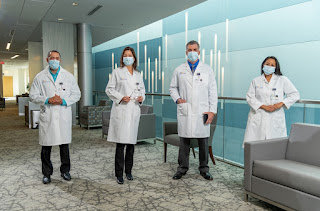Two Years of Advancing Health through COVID-19 Research
Dear Friends and Colleagues,
This week marked the 2-year anniversary of our community’s first known case of
COVID-19. As we start to reconnect with family and friends, we find ourselves
reflecting on the experience. Some things will never be recaptured because of
the pandemic, like my son’s senior year in high school or his final season on
the baseball mound. On the other hand, the pandemic has helped us grow and
become stronger. I proudly witness his, and others, enhanced ability to deal
with unpredictability, greater accommodations for rapid change and a resilience
that young people rarely possess.
So, this morning I asked him what the best thing was to come out of the
pandemic. As a business major studying for exams, he immediately shared
the stats on the skyrocketing number of startups in the last 2 years. As
a scientist, I can also attest that these have been banner years for science
and for research at MedStar Health.
While our main priority is caring for our community while ensuring the safety
of our associates, patients, and research participants, science has not slowed
down. As an academic health system, we have stepped up to address the greatest
challenges COVID-19 has presented.
Our goal has always been to advance
health through research to help our patients of today and tomorrow:
- We’ve grown our portfolio of
research related to COVID-19 from 50 studies in May of 2020 to more than
200 current active clinical studies today.
- In the fall of 2020, MedStar
Health was a leader in the national consortium for the COVID Community Research Project (CCRP), an at-home research study to
help us better understand the best ways to treat and prevent COVID-19,
enrolling more than 14,000 participants in our region.
- Researchers at MedStar Health
led an international team that used artificial intelligence to evaluate cardiac images from patients across the globe
who had COVID-19 to predict who is at greatest likelihood to die from
COVID-19.
- The Research Institute brings a
community based, health equity lens to all of the work that we do,
including disparities of COVID-19 care, vaccine hesitancy and
accessibility. As an example, MHRI researchers are applying artificial intelligence
techniques
to develop a tool in the emergency department that supports safe
discharges of COVID-19 patients and can address disparities in care.
As we continue in our fight to end the pandemic, we remain
committed to better understand this virus and improve our therapeutic
approaches and its long-term consequences. In this month’s newsletter, we
highlight collaborative work we’re doing with NIH to improve COVID-19 research to better treat and care for our patients. In this edition,
you’ll also see how we were able to gain knowledge to help others as we rapidly
built-out two monoclonal infusion centers for outpatient management of COVID-19.
The rain has cleared and the sun came out to a glorious 75 degrees today! I am
grateful for the hints of spring and the falling COVID-19 numbers.
However, I am even more grateful to work with such wonderful people,
demonstrating their resilience to accomplish such meaningful and impactful
work. As One MedStar, there’s nothing we can’t accomplish together. And for me,
that is why its been a banner two years!
Thank you for your
contributions to advancing health.



